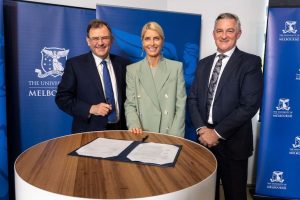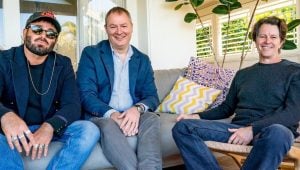Government-backed investment fund Breakthrough Victoria has defended itself against critics wanting it abolished saying it wants to “fundamentally reshape the innovation landscape”.
The $2 billion VC fund, launched in 2021, and chaired by former Labor premier John Brumby, has been subject to a sustained media campaign for it to be dismantled, led by Adir Shiffman, chair of ASX-listed Catapult Group, and Seek cofounder Matt Rockman.
The Labor government conceived Breakthrough Victoria three years ago in the midst of the Covid pandemic and ongoing lockdowns that crippled the state’s economic activity as an independent company to stimulate commercialisation and potentially create 15,000-plus jobs. In some ways it’s a prototype version of federal Labor’s $15bn National Reconstruction fund.
Shiffman’s siege of Breakthrough Victoria began last August in his regular column for the AFR, labelling it a “state-owned enterprise competing with established commercial VC funds” expressing concern that it could “fall victim to political expediency”.
More recently his rhetoric has hardened into calls to close it down amid concerns about Victoria’s gross debt of $126 billion.
The fund has deployed around $300 million of its $2 billion allocation from the state government. Many in the state are bracing for a tough budget in May.
On LinkedIn on Wednesday Shiffman said the fund was “poorly conceived, suspiciously political, huge, opaque, using the wrong KPIs, an overly broad and unclear mandate, poor governance, and reporting that is slower than expected and provides little clarity”.
There is “no need for $2 billion of government money competing against an ocean of private venture capital in Australia,” he wrote
“The right decision is to return the money – or at least a large portion of it – back to Victorian taxpayers. Of course, none of this will happen. The election is not for another two years and Labor is way, way, way ahead.”
Last week, AFR picked up the cudgels.
Its coverage began on March 11 with the headline Board exodus: Vic government start-up fund spent $22m to invest $74m.
“The fund invested just $73.7 million last year, but had $22 million in expenses, equivalent to 30 per cent of the invested capital – a rate venture capitalists warn is wasteful and uncommercial,” the story said, also pointing to three directors, including Carsales director Kee Wong leaving the eight-member board.
It followed up the next day with story on redundancies at epilepsy monitoring startup Seer Medical, which is reportedly received tens of millions in funding from Breakthrough Victoria.
Day 3 was about the Victorian opposition referring the fund to the state’s auditor general.
This week Schiffman and Rockman continued calls to shut down Breakthrough Victoria on ABC TV’s 7.30.
“On the face of it it looks stacked with academics and bureaucrats and ex government officials,” Rockman said of the board.
His Seek cofounder, Andrew Bassat, was on Breakthrough Victoria’s board for its first year, stepping down in March 2022.
Rockman, who went on to work with Paul Bassat, Seek’s other cofounder, at Square Peg, and now invests in startups – this week he backed advertising analytics platform Prophet – told the ABC “you’ve got to question the size of the cost base, the salaries being paid, the size of the team… it seems very very cost heavy for a fund of that size”.
Breakthrough Victoria has around 50 staff and an annual wages bill of nearly $10 million.

Melbourne Uni Vice-Chancellor Duncan Maskell; Anna Shave from Tanarra Capital; and Breakthrough Victoria CEO Grant Dooley, at the launch of Tin Alley Ventures in 2023.
Critics pointed to total costs of $22 million with just $73.7 million invested last financial year.
But Breakthrough Victoria argues they misread the 2023 Annual Report, conflating BV‘s operating expenses, minus investment-related costs and grant expenses, for a 28 month period since its inception, from March 2021 to June 2023 – $24 million all up – the compared it to 12 months of investment.
“This figure incorporates all company establishment costs, professional services and salaries incurred during that 28-month period,” BV said.
It’s worth noting that plenty of VC dramatically scale back their investment in 2023 after a record year, so many would less impressive costs-to-investments ratios last year.
This week Victorian treasurer Tim Pallas said Breakthrough Victoria had “teething problems”, but he’s not going to wind up the fund.
More than just a VC
Breakthrough Victoria put its case in a details response this week, saying it’s more than just a venture capital firm.
“The challenges in raising funding in the early stages of commercialisation, and as businesses seek to grow outside of Victoria into overseas markets, are widely understood,” CEO Grant Dooley said.
“At BV, we seek to bridge both these funding “Valleys of Death. As a three-year-old company, our focus is on refining processes, building relationships, and increasing awareness about the role BV can play in the market. But we are already having a significant impact”.
He said the fund has now exceeded $300 million in committed capital, including 22 direct investments in innovative companies.
Some have been deep tech investments alongside the likes of CSIRO-backed VC Main Sequence, such as Quantum Brilliance and fermented dairy alternative Eden Brew’s $25 million Series A.
Then there’s firefighting virtual reality training startup FLAIM, baby-saving medtech startup Navi, anti-plagiarism edtech Cadmus, and electric plane engine aerospace startup Kite Magnetics.
And the fund has certainly thought outside the square, putting up $10 million for a challenge to address one of the next decade’s biggest recycling problems: solar panels.

Singer Angus Stone with Eden Brew CEO Jim Fader and Bernard Fanning, who invested in the startup alongside Breakthrough Victoria.
As well as supporting Melbourne Uni’s new VC fund, Tin Alley Ventures, which attracted coinvestments from the likes of barrister Allan Myers, Acciona Australia CEO Bede Noonan, and Goldman Sachs Australia chair Christian Johnston, there was support for the Jumar Biotech Incubator, run by Sydney’s Cicada Innovations at CSL. University of Melbourne has been a major beneficiary among six university innovation partnerships, as part of a $100 million plan that’s also backed Deakin, La Trobe, Monash, RMIT and Swinburne to commercialise research.
“Through our direct investments and industry partnerships we are working to fundamentally reshape the innovation landscape,” Breakthrough Victoria said in its defence this week, arguing that it’s investment go beyond a financial return.
“As an impact investor, BV believes in the power of capital to have a positive impact on people’s lives and the planet. By investing in and supporting the ideas, businesses and products that can change lives for the better, the team at BV are driven not solely by financial returns, but also to improve the wellbeing of Victorians and people around the world,” BV said.
“Our portfolio companies are already generating a positive social and environment impact for all.”
In January, Breakthrough Victoria announced $12 million for biotech startup Aravax, which developing a new peanut allergy treatment – something 2% of children suffer from.
Aravax’s chief financial officer, Thomas Ulmer, came out in support on LinkedIn saying the company” greatly appreciated the professionalism in which the discussions were held with the investment team around a possible investment of Breakthrough Victoria”.
Epilepsy monitoring medtech Seer Medical was one of BV’s first investments and been the startup critic honed in on – the “Vic government’s losing VC bet” in the AFR’s headline – for retrenching staff.
Breakthrough Victoria says its investment in Seer is in the form of a convertible note, not direct equity.
CEO Grant Dooley said that investment structure affords BV downside protection and additional rights to ensure impact for Victorian taxpayers from the investment. As the convertible note has not yet been converted into equity in Seer, it retains its current value.
“BV continues to believe in Seer and its technology. It’s a world leader in neurological monitoring for epilepsy. They’re on target to do $11 million in revenue this financial year, and as of September 2023 they had over 15,000 patients in Australia,” he said.
Slower-than-expected expansion into the US has put pressure on Seer’s balance sheet, the fund said, and it’s working with the medtech on measures to help them through this period.
Transparency questioned
Another criticism of the fund is that it’s opaque. Jessy Wu from Afterwork Ventures told the ABC that all Victorian taxpayers are limited partners in the fund, arguing that just as most VCs send out regular updates to their LPs on their portfolio companies, Breakthrough Victoria should be doing the same.
Breakthrough Victoria said that as a private company with government overlay, it’s “subject to more scrutiny, more checks and balances and more reporting requirements than most other investment firms”.
The fund said that it’s deal flow has seen it receive more than 1,000 potential investment opportunities for funding totalling more than $3 billion.
Dooley said the applications highlight the enormous level of unmet demand for VC and private equity funding to support company development in the innovation and technology community.
“Over the last week we’ve received overwhelming support from fellow investors, founders and CEOs and the innovation ecosystem globally,” Dooley said. I’m proud of the work we do at BV, our team and our portfolio companies and to be delivering for Victorians everyday.”
























